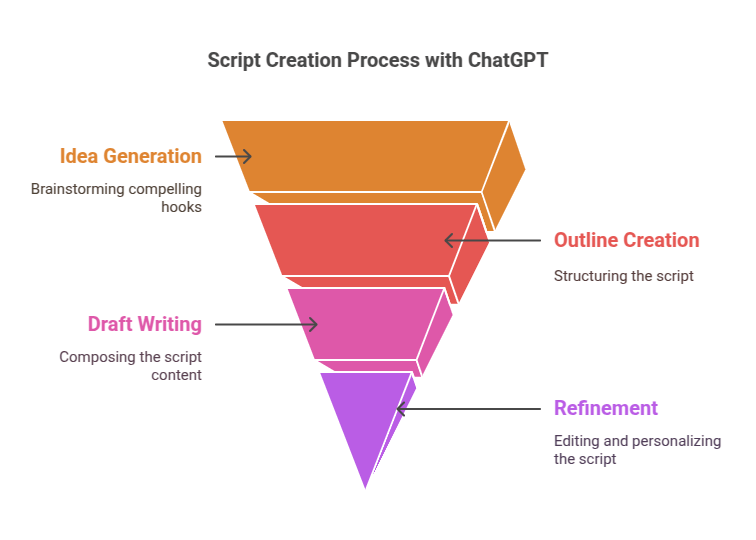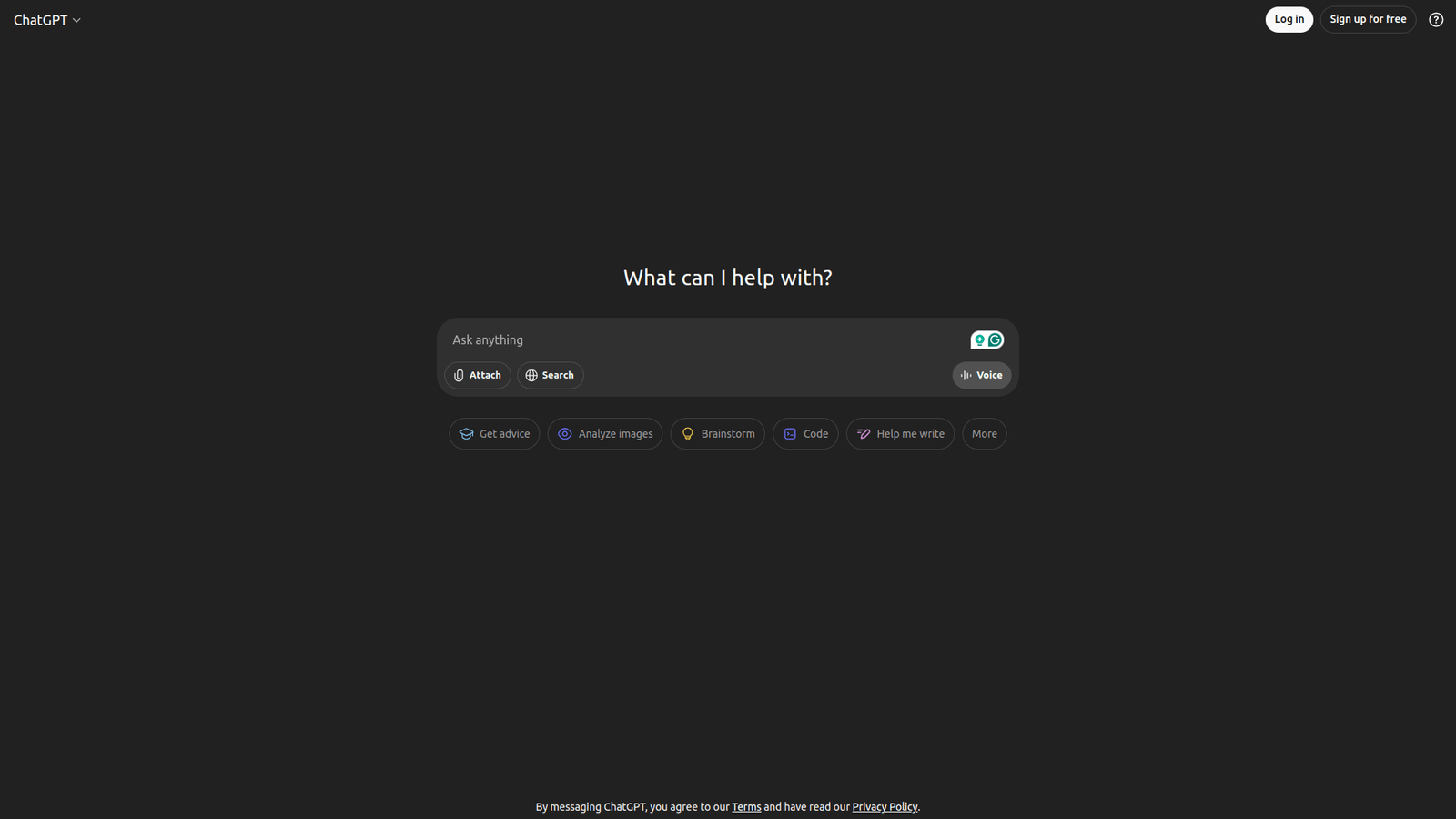ChatGPT supercharges your Script Writing and Storytelling. Beat creative blocks and boost output fast. Ready to transform your content? Try ChatGPT today!
The Real Impact of Using ChatGPT for Script Writing and Storytelling
Content creation is exploding.
Everyone needs words, ideas, stories.
Especially scripts.
For videos. For podcasts. For sales.
Writing scripts and crafting stories takes time.
Brainstorming. Outlining. Drafting. Redrafting.
It’s a grind.
And guess what?
AI is here.
Not replacing humans.
But changing how we work.
And leading the pack?
ChatGPT.
It’s not just a chatbot.
It’s a tool. A serious tool.
One that can seriously impact your content creation workflow.
Specifically, your Script Writing and Storytelling.
I tried it. Hard.
And the impact was real.
Here’s what happened.
Table of Contents
- What is ChatGPT?
- Key Features of ChatGPT for Script Writing and Storytelling
- Benefits of Using ChatGPT for Content Creation
- Pricing & Plans
- Hands-On Experience / Use Cases
- Who Should Use ChatGPT?
- How to Make Money Using ChatGPT
- Limitations and Considerations
- Final Thoughts
- Frequently Asked Questions
What is ChatGPT?
Okay, first up. What exactly is this thing?
ChatGPT is a large language model.
Built by OpenAI.
Think of it like a super-smart text machine.
You type in a request.
It spits out text.
Text that looks and sounds like it was written by a human.
It’s trained on massive amounts of data.
Books, articles, websites, conversations.
So it understands language.
Context. Tone. Style.
Who is it for?
Writers. Marketers. Students. Developers.
Basically, anyone who works with words.
Which, let’s be honest, is most people these days.
Especially if you’re in the content creation game.
It can write emails.
Draft articles.
Generate ideas.
And yes, help with Script Writing and Storytelling. Big time.
It takes your raw idea.
Or just a topic.
And helps you build a narrative.
Structure a script.
Flesh out characters.
Write dialogue.
It’s a digital assistant for your brain.
But you gotta know how to ask the right questions.
We’ll get into that.
For now, just know it’s a powerful text generator.
Ready to help you produce more. Faster.
Key Features of ChatGPT for Script Writing and Storytelling
Alright, let’s talk features.
What can this thing actually do for your scripts and stories?
More than you might think.
- Idea Generation and Brainstorming:
Staring at a blank page?
Creative well running dry?
ChatGPT is a fantastic brainstorming partner.
Give it a topic.
Or a theme.
Ask for 10 video ideas about “launching a sandwich shop.”
Or 5 plot twists for a short film about a runaway cat.
It’ll fire back ideas. Fast.
Some will be duds.
Some will spark something.
It’s like having a room full of interns shouting ideas.
Without paying them.
Or needing coffee.
This kills creative block stone dead.
- Outline and Structure Assistance:
Got the idea?
Now you need a structure.
A flow.
ChatGPT can help outline your script.
Or story arc.
Ask it for a 3-act structure for your video script.
Or a scene breakdown for a podcast episode.
“Give me an outline for a sales video script selling online courses.”
“Outline a 5-minute YouTube video explaining compound interest.”
It provides a framework.
A backbone.
You fill in the meat.
Saves ages figuring out where to start.
And how to finish.
- Drafting Script Sections and Dialogue:
This is where it gets interesting.
ChatGPT can write actual text.
Provide a scene description.
Ask for dialogue between two characters.
Give it a topic for a monologue.
“Write a 30-second intro script for a finance podcast.”
“Draft dialogue for a scene where someone discovers a hidden map.”
It won’t be perfect.
You’ll need to edit. Tweak. Add your voice.
But getting a first draft…
Or even just a tough scene written…
Is a massive head start.
It handles different tones.
Funny, serious, corporate, casual.
Tell it the style.
And it takes a swing.
This feature alone can save you hours of staring at a blinking cursor.
Benefits of Using ChatGPT for Content Creation

Okay, features are one thing.
But what’s the payoff?
Why bother integrating this into your workflow?
Several big reasons.
First, Speed.
This is huge.
Getting a first draft done.
Generating 20 headline options.
Outlining a 10-part video series.
ChatGPT does this in minutes.
What used to take hours of brainstorming and typing…
Now happens while you sip your coffee.
Speed matters.
More output. Faster delivery.
Second, Beating Creative Blocks.
We’ve all been there.
Stuck. No ideas. Zero motivation.
ChatGPT is like a kick in the pants for your brain.
It provides starting points.
Different angles.
Even bad ideas are better than no ideas.
It breaks the inertia.
Gets you moving again.
Third, Improving Quality (Surprisingly).
Wait, doesn’t AI just produce generic stuff?
Sometimes. If you ask it generic questions.
But it can suggest better phrasing.
Different ways to structure sentences.
More compelling hooks.
You can ask it to rewrite something in a specific tone.
Or make it punchier. More direct.
It acts as an editor.
A second pair of eyes.
It can spot logical gaps in your story.
Or suggest better transitions in your script.
So, it doesn’t replace your skill.
It augments it.
It can help you produce higher quality work.
By giving you more options.
And pointing out weaknesses you might miss.
Fourth, Cost Efficiency.
Hiring writers is expensive.
Hiring brainstormers is… not really a thing, but you get it.
ChatGPT has a cost.
But compared to human labour for repetitive tasks?
Or just getting *something* down on paper?
It’s incredibly cheap.
Especially for initial drafts or idea generation.
You can redirect your human brainpower to higher-level tasks.
Strategy. Editing. Adding that human touch.
The grunt work? Let the machine handle it.
It’s a smart investment for any serious content creation effort.
Especially in Script Writing and Storytelling, where iterating quickly is key.
Pricing & Plans
Okay, let’s talk brass tacks.
What’s the damage?
Is this going to empty your pockets?
Good news: there’s a free version.
ChatGPT 3.5.
It’s pretty capable.
You can do a lot with it.
Generate ideas. Draft short pieces. Experiment.
It’s a great way to test the waters.
See if it fits your workflow.
However, the free version can be slow during peak times.
And it doesn’t have access to the very latest model.
That’s where ChatGPT Plus comes in.
This is the premium version.
Costs money. About $20 a month last I checked.
What do you get?
Access to GPT-4.
This is a significant upgrade.
It’s smarter. More nuanced. Better at understanding complex prompts.
It’s also faster.
Available even when demand is high.
And you get early access to new features.
Like browsing the internet.
Or using plugins (though that’s evolving).
For serious content creation…
Especially if you rely on it daily…
The Plus version is worth the cost.
It’s an operational expense.
Like software. Or coffee.
Does it compare to alternatives?
There are other AI writing tools.
Jasper, Copy.ai, etc.
Many of them use OpenAI models under the hood anyway.
Or they are more niche.
Better for specific types of copy.
ChatGPT is more general-purpose.
More flexible for creative tasks like Script Writing and Storytelling.
Its strength is its conversational nature.
You can refine your prompts.
Go back and forth.
Shape the output.
Many other tools are more template-based.
Fill in blanks. Get result. Less iterative.
So, for deep work on narratives and scripts…
ChatGPT feels more like a collaborator.
The price for Plus is competitive.
Especially considering the time it saves.
Hands-On Experience / Use Cases

Enough theory.
How does this actually work in practice?
I used ChatGPT extensively for Script Writing and Storytelling.
Here’s a typical scenario.
Let’s say I need a script for a 2-minute YouTube video.
Topic: “Why You Should Start an Email List.”
First, Idea Generation.
Prompt: “Give me 5 compelling hooks for a YouTube video about starting an email list.”
ChatGPT gives me things like:
“Are you losing money every day you don’t have an email list?”
“The secret weapon top online businesses use (and you aren’t).”
Okay, some good angles there. I pick one.
Next, Outline.
Prompt: “Outline a 2-minute YouTube script based on the hook ‘Are you losing money every day you don’t have an email list?’. Include intro, problem, solution (email list), benefits, call to action.”
It provides a point-by-point structure:
0:00-0:15 – Hook: State the problem (missing out on sales).
0:15-0:45 – Explain *why* you’re losing money (no direct access to audience).
0:45-1:30 – Introduce the solution: The email list. Explain its power.
1:30-1:50 – List key benefits (control, direct communication, higher conversions).
1:50-2:00 – Call to Action (subscribe, download a guide).
This is a solid blueprint.
Now, Drafting.
Prompt: “Write the script for the section 0:45-1:30 based on the outline. Make it energetic and persuasive. Use short sentences.”
ChatGPT writes a draft for that specific part.
“So, what’s the fix? How do you stop leaving cash on the table? The answer is simple. It’s your email list. Think of it. Your own private channel. No algorithms. No gatekeepers. You own the connection. You decide when and what to share. This is powerful.”
See? Not bad. It’s a starting point.
I can then refine it.
Add my personality. My specific examples.
Maybe the tone isn’t quite right.
Prompt: “Rewrite that section, but make it sound more like a casual chat with a friend.”
It tries again.
“Alright, so how do we fix this? How do you stop losing potential sales? Honestly? Get an email list going. Seriously. It’s like having a direct line to your favourite customers. No social media getting in the way. You call the shots. You own that audience connection. It’s a game-changer, trust me.”
Better! Closer to my style.
I repeat this process for other sections.
I might ask it to write specific transitions.
Or suggest a compelling story to include.
Prompt: “Give me a short anecdotal story I can use to illustrate the power of email lists.”
It can come up with a fictional mini-story.
Or suggest real-world examples to research.
The key is this: I’m not asking it to write the whole script perfectly from scratch.
I’m using it as a tool.
For brainstorming. Structuring. Drafting. Iterating.
My role is the director.
I give the instructions. I review. I edit. I refine.
I inject the human element. The specific details only I know.
The result?
A finished script.
That took maybe half the time.
And often, the quality is better.
Because I explored more options for hooks, angles, and phrasing than I would have alone.
This approach is hugely effective for video scripts, podcast outlines, sales copy frameworks, even simple fictional narratives for social media.
It amplifies your own creativity and efficiency.
Who Should Use ChatGPT?
So, is this tool for everyone?
Not necessarily *everyone*.
But definitely a lot of people.
Here’s who gets the most bang for their buck:
Content Creators: Bloggers, YouTubers, podcasters. If your living depends on producing content consistently, speed and idea flow are critical. ChatGPT helps massively with both.
Marketers: Writing ad copy, landing page text, social media posts, email sequences. All of this benefits from rapid iteration and brainstorming. ChatGPT is built for this.
Small Business Owners: Need to write website copy? Draft a sales pitch? Create social media posts? ChatGPT can help you punch above your weight without hiring full-time staff.
Agencies: Managing multiple clients means churning out content volume. Using ChatGPT for initial drafts, research summaries, and idea generation can significantly increase throughput.
Writers (of all kinds): Novelists stuck on a scene? Screenwriters needing dialogue inspiration? Copywriters needing variants? It’s a writing assistant, not a replacement.
Students/Researchers: Structuring essays, summarising complex texts, brainstorming research questions. Useful, but be careful about plagiarism and always verify facts.
Anyone Overcoming Creative Blocks: If you work in a field requiring writing or ideas and you get stuck, ChatGPT is a great unblocker.
Specifically for Script Writing and Storytelling, it’s gold for:
Video producers needing consistent script ideas and drafts.
Podcasters structuring episodes and segments.
Sales teams crafting compelling sales scripts or presentations.
Trainers building narrative flows for courses.
Social media managers creating short, engaging stories.
If your work involves translating ideas into structured, engaging text…
And you value speed and efficiency…
Then ChatGPT is probably a tool you should investigate.
It’s not a magic bullet.
It requires you to be the driver.
But if you’re willing to learn how to prompt it effectively…
It pays dividends.
Don’t outsource your core thinking…
But let the AI handle the heavy lifting of putting words on the page.
How to Make Money Using ChatGPT

Okay, let’s talk money.
Can you actually make cash with this tool?
Absolutely.
It’s not about the tool itself making money.
It’s about how you use it to deliver value.
And value equals money.
Here are some ways:
- Offer Script Writing Services (Faster):
People need video scripts, podcast outlines, sales scripts.
This is a direct application of ChatGPT’s strength.
You can take on more clients.
Deliver faster turnaround times.
While maintaining quality (because you’re editing and refining).
Charge market rates.
Your cost (ChatGPT subscription) is low.
Your output (finished scripts) is high.
Profit margin increases.
You’re not selling “AI writing.”
You’re selling fast, high-quality script writing services.
Enabled by AI.
- Boost Your Own Content Output (More Revenue):
If you’re a content creator…
More content often means more views, more subscribers, more sales.
ChatGPT helps you publish more videos, more podcast episodes, more often.
This scales your platform.
Leads to more ad revenue, affiliate income, product sales.
It’s an efficiency gain that directly impacts your income potential.
Less time spent on drafting means more time on promotion, engagement, strategy.
- Create & Sell Digital Products:
Use ChatGPT to generate content for ebooks, guides, online courses.
You could write a detailed guide on “How to Shoot Your First YouTube Video.”
Or a template pack of sales script openers.
ChatGPT can help write the content for these products.
Outline chapters. Write sections. Generate examples.
You then package and sell them.
The heavy lifting of initial content creation is reduced.
Leaving you to focus on productisation and marketing.
Here’s a simple example:
Someone needs 10 short video scripts for Instagram Reels about fitness tips.
Without AI, you brainstorm, research, write, rewrite. Takes maybe 3-4 hours.
With ChatGPT, you prompt: “Generate 10 Instagram Reel script ideas about fitness. Each script should be under 60 seconds. Focus on actionable tips.”
It gives ideas. You pick one.
Prompt: “Write a 45-second script for Reel idea #3: ‘The 5-Minute Workout That Burns Fat’.”
It drafts it. You edit, refine, add your expertise.
Total time for 10 scripts? Maybe 1.5 – 2 hours.
You still charge for 10 scripts.
Maybe you charged $50-$100 per script before. That’s $500-$1000.
Now you do the same work, potentially faster, with less mental drain.
Your hourly rate effectively increases.
Or you take on twice the clients.
I know creators who use ChatGPT daily to draft outlines for their YouTube videos.
They used to spend hours just figuring out the structure.
Now they get an outline in minutes.
This frees up their time to film, edit, and plan more content.
Their output increased. Their ad revenue followed.
It’s about leveraging the tool to do more, faster, and better.
Which directly translates to earning potential.
Limitatons and Considerations
Alright, before you go thinking this is a magic wand…
It’s not perfect.
There are downsides. You need to know them.
First, Accuracy Isn’t Guaranteed.
ChatGPT can hallucinate. Make things up.
It doesn’t “know” facts in the human sense.
It predicts the next word based on patterns.
So, if you ask it for statistics or specific historical events…
Always double-check them.
Seriously. Verify everything important.
Especially if your script or story relies on factual information.
Second, It Needs Editing and Refinement.
The output is a draft.
It often lacks nuance, specific voice, and creative sparkle.
It can sound a bit generic. Flat.
You have to edit it. Shape it. Inject your personality.
This isn’t a copy-paste operation (and shouldn’t be).
Think of it as getting 80% of the way there.
You provide the crucial last 20%.
The human touch. The unique perspective.
Third, Learning Curve for Prompting.
You don’t just ask “write me a script.”
Well, you can, but it won’t be great.
Getting good results requires good prompts.
You need to be specific.
Define the audience, tone, length, key points, desired outcome.
“Write a 30-second Instagram Reel script for small business owners about using TikTok, in a casual, energetic tone, ending with a call to action to follow for more tips.”
That’s better.
Learning how to “talk” to the AI effectively takes practice.
Fourth, Lack of True Creativity or Originality.
ChatGPT rearranges existing information and patterns.
It doesn’t have consciousness.
It won’t come up with a truly revolutionary plot twist out of nowhere.
Or deep, complex character motivations it hasn’t seen examples of.
It’s a pattern machine.
For truly original storytelling or deep creative work, you still need the human brain.
It assists creativity, but doesn’t replace it.
Fifth, Ethical and Ownership Questions.
Who owns the content created? OpenAI says you do.
But is it truly “yours” if the AI drafted it?
What about using famous characters or copyrighted material?
(Don’t do that without permission, AI or not).
These are evolving areas.
For most business or marketing Script Writing and Storytelling, it’s less of an issue.
But for fiction or sensitive topics, be mindful.
Know its limits.
Use it as a co-pilot, not an autopilot.
It’s a powerful tool when used correctly.
Dangerous if you trust it blindly.
Final Thoughts
So, where do I land on ChatGPT for content creation?
Specifically for Script Writing and Storytelling?
It’s not just hype.
It’s a legitimate tool.
It changed my workflow.
Significantly.
I get past the blank page faster.
I explore more angles and ideas.
I get decent first drafts in minutes.
This frees me up.
To focus on the human stuff.
The strategy. The unique voice. The final polish.
The part that makes content resonate.
It won’t make you a great writer overnight.
But if you are already a writer…
Or if you need to write scripts and stories for your business…
It can make you much faster.
More prolific.
And potentially, better.
Because you have more raw material to work with.
More ideas to choose from.
It’s like having an assistant who never sleeps and knows a lot about words.
But needs constant direction.
My recommendation?
If you’re serious about content…
Especially video, podcasting, sales…
Where scripts and narratives are key…
You need to try ChatGPT.
Start with the free version.
Experiment. Learn how to prompt it.
See how it handles your specific tasks.
If you see the potential…
If it saves you time…
The paid version is likely a solid investment.
It’s not about replacing human creativity.
It’s about augmenting it.
Working smarter.
Producing more value.
Faster.
In the rapidly moving world of content…
Tools like ChatGPT are becoming essential.
Get on board.
Or get left behind.
Visit the official ChatGPT website
Frequently Asked Questions
1. What is ChatGPT used for?
ChatGPT is primarily used for generating human-like text based on prompts. This includes writing articles, emails, code, and importantly for content creation, helping with script writing, storytelling, brainstorming ideas, and outlining content structures.
2. Is ChatGPT free?
Yes, there is a free version available, ChatGPT 3.5. OpenAI also offers a paid subscription, ChatGPT Plus, which provides access to the more advanced GPT-4 model, faster response times, and priority access to new features for a monthly fee.
3. How does ChatGPT compare to other AI tools?
ChatGPT is a versatile, general-purpose language model. While other AI writing tools might specialize in specific types of content (like ad copy or blog posts), ChatGPT’s strength lies in its conversational interface and flexibility, making it highly adaptable for creative tasks like iterative script development and complex storytelling assistance.
4. Can beginners use ChatGPT?
Yes, beginners can definitely use ChatGPT. The interface is simple – you just type in your request. The key is learning how to write clear and specific prompts to get the best results, which improves with practice.
5. Does the content created by ChatGPT meet quality and optimization standards?
The content generated by ChatGPT can be a high-quality starting point, but it often requires human editing to meet specific quality, brand voice, and optimization standards. It’s a tool to assist, not replace, the final polish and strategic thinking required for effective content. Always review and refine the output.
6. Can I make money with ChatGPT?
Absolutely. You can use ChatGPT to increase your efficiency in existing services like script writing or content creation, allowing you to take on more clients or projects. You can also use it to speed up the creation of digital products or content that you can then monetize. It’s a productivity booster that can directly impact your earning potential.






